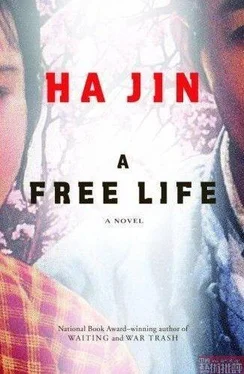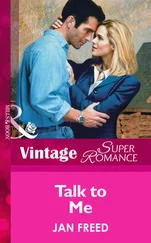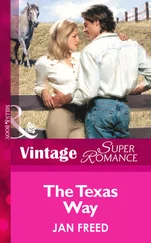EVERY Monday morning Nan went to the Chinese bookstore in Asian Square to buy the Sunday World Journal, which, unlike English-language newspapers, wouldn't arrive until midafternoon every day. He couldn't get it on a daily basis, so once a week he'd drive ten miles to Doraville to buy the Sunday paper; this was his way to keep abreast of the news about China and the Chinese diaspora. Besides getting the newspaper, he'd also visit the stores and the supermarket there to check the prices of groceries. His Monday trip to the shopping center was a kind of diversion to him, a luxury, since he had never taken a day off except on major holidays when no customers would show up. One morning in late June he turned up at the Chinese bookstore again, which was owned by World Journal, whose regional editorial division occupied two rooms in the back of the store. Several editors and typists worked in there on the advertisements and the local news for the southeastern section of the newspaper. As usual, Nan picked up the Sunday paper, then looked through the new books on the two display tables and flipped through some of the journals and magazines on the shelves. Among all the publications he liked the Mirror Monthly best because it carried well-informed articles on cultural and current issues, mostly written by reputable authors and scholars living in Hong Kong, Taiwan, and North America.
He noticed a new book on American life entitled Under the Star-Spangled Banner, written by a recent visitor from mainland China to the United States. He disliked this sort of writing targeted to the readers who could never set foot in America, because the writers often told exotic tales that distorted the truth. He remembered that one author had even bragged that American wives were so understanding toward their husbands that whenever their men were about to travel, the women would pack condoms into their baggage, implying they wouldn't mind if their husbands had a brief fling away from home, as long as they didn't leave behind their hearts with other women. A novelist who was a political officer in the People's Liberation Army boasted that he had walked alone at night through Chinatown in New York without taking fright; in an interview, when asked what the American democracy was like, he replied, "A lot of paperwork and high taxes." A woman author claimed that she had increased her worth from $300 to $5 million after living in the United States for just six years, and that now she was a CEO of a textile company, her cargo containers always on the move, traveling all over the Pacific and the Atlantic. An upstart in Florida even bragged that his ambition was to own a few satellites in space.
Whenever Nan flipped through these books, his heart would sink-almost every person described in them was a paragon of success. Who will speak for the failures? he wondered. What's worse, these books were often crudely written, in a journalistic style, and many of them were a mere mishmash of articles, each of which the author could finish at one sitting. These writers rushed to report sensational news of petty triumphs before they had lived here long enough to develop genuine feelings for this lonesome, unfathomable, overwhelming land. Look at these titles on the shelf-Here Is a Real America, Conquering the United States, I Have Become a Successful Lawyer in the Bay Area, Chinese Celebrities in North America, Our Growth in the USA, A Boss on Wall Street, My Bite of the Big Apple.
As Nan opened the June issue of Harvest, a major literary bimonthly published in Shanghai, an author's name caught his eye- "Danning Meng" printed under a novella entitled Winds and Clouds at an Alaskan Seafood Cannery. Nan was astounded to see his friend's name in such a top-notch magazine. He turned to the first page of the story and skimmed several paragraphs. Without doubt the author was his friend Danning, since the story was set in America and even mentioned Boston. He bought that copy of Harvest.
On his drive back along Buford Highway, whenever he stopped at a red light, he'd pick up the magazine and look at the illustrations and the table of contents. Some of the authors' names were familiar to him, and some were not. At the intersection of Jimmy Carter Boulevard he almost bumped into a brand-new passenger van, which bore a silver Darwin fish and a large sticker with red letters: licensed to bitch! That frightened Nan, and he forced himself not to touch the magazine again until he reached the Gold Wok.
That day at work, whenever he had a free moment, he would read a page or two of Danning's novella. At home that night, he lay on his bed and resumed reading it. He didn't feel it was extraordinary; the writing was sloppy, though the story was interesting and enjoyable. It was told in the first person, in the form of a memoir, and it described how the owner of an Alaskan cannery exploited his workers, who were mostly recent immigrants from Vietnam, South Korea, China, Mexico, and Eastern Europe. The narrator, presented as Danning's doppelganger, was a graduate student specializing in agronomy at the University of Wisconsin-Madison and went to work in Alaska during the summer to make money for the next year's tuition. The cannery was depicted like a Chinese factory, where industrious workers often got into trouble, bad-mouthed by others, while slackers were trusted and rewarded for their clever words and deeds. Many dawdlers would clock in early and clock out late, but would slack off at work; some would find every excuse for staying on so as to get paid overtime. Furthermore, racial prejudice was widespread, the supervisors acted like little bullies, and most of the workers ate seafood whenever their foremen turned away. Fights broke out among them every day, and some girls were at one another's throats over a hunk, though there were decent people among the working hands. One man had previously been a lieutenant colonel in the Vietnamese army, and another a philosophy professor in Romania who could hardly speak any English. It was a dark story in spite of the narrator's breezy voice.
Turning off the light, Nan thought about the novella, which had somehow disquieted him. The story was believable, full of authentic details that brought the setting to life. Apparently Danning had done a lot of research and thinking, and Nan knew his friend had once been to Alaska, though he didn't believe Danning had ever worked in a cannery. What troubled him more was the insouciant style, full of misfired digs and riffs, which tried too hard to be funny and tantalize the reader. As a result, the humor felt forced and glib, not arising from within the drama, as if the narrator laughed before the audience, as if the author had become the victim of his own wisecracks. More troublesome, Danning had overused four-letter intensifiers, which appeared on every page. Still, Nan was happy for his friend, who had made a breakthrough in just two years after his return to China. Beyond question, his friend had become a literary figure of sorts. The fiction editor at Harvest called the readers' attention to Danning's novella in her introduction to this special issue devoted to "literature by students studying abroad." Indeed, the other four featured writers had all lived or were still living in foreign countries. Among the stories Danning's novella seemed to be the center, since the other pieces were much shorter, one just two and a half pages long.
Nan gave the magazine to Pingping, who read the cannery story during the next few days. She shared his view about the writing. "Danning didn't have to be that flippant and coarse," she told him. " He forgot to mention that among all workers the Chinese were the worst, much worse than the Vietnamese and the Mexicans." Pingping had once worked in a nursing home that hired many recent immigrants, among whom, she felt, the Korean women were the best workers.
Читать дальше












